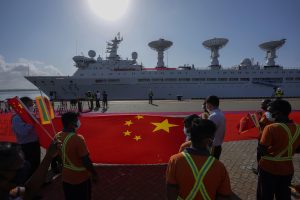A Chinese navy vessel arrived at a Beijing-built port in southern Sri Lanka on Tuesday, after its port call was earlier delayed due to apparent security concerns raised by India.
The Yuan Wang 5 sailed into the Hambantota port and was welcomed by Sri Lankan and Chinese officials. The development could spark worry in India, which views China’s rising influence in the Indian Ocean with suspicion.
Sri Lanka has referred to the Yuan Wang 5 as a “scientific research ship,” but there are fears in India that the vessel could be used to surveil the region, with multiple media reports calling it a “dual-use spy ship.”
“The Yuan Wang 5 is a powerful tracking vessel whose significant aerial reach — reportedly around 750 km — means that several ports in Kerala, Tamil Nadu and Andhra Pradesh could be on China’s radar,” the Indian Express newspaper wrote.
The closely watched developments surrounding the vessel underscore the competing interests of regional giants India and China in the small island nation. For more than a decade, Sri Lanka’s strategic location in the Indian Ocean and along one of the busiest shipping routes has seen both countries vie for influence.
Over the years, Beijing was widely seen as having an upper hand with its free-flowing loans and infrastructure investments. But Sri Lanka’s economic collapse proved an opportunity for India to gain greater sway, as New Delhi stepped in with massive financial and material assistance to its neighbor.
The ship has permission to dock in Hambantota until August 22, Sri Lanka’s Foreign Ministry said last weekend. It added that China had agreed the ship would keep its identification systems on and would not carry out any research activities while in Sri Lankan waters.
“Given the geopolitical dynamics in the region and Sri Lanka’s heavy vulnerability on the economic front, Sri Lanka is playing with two fires at a diplomatic level,” said international affairs analyst Ranga Kalansooriya.
The Yuan Wang family of naval vessels serve both the Chinese missile force and its space program, which is run by the People’s Liberation Army, the military wing of the ruling Communist Party.
Previous official Chinese media reports have described PLA officers serving in command positions aboard the vessels in the Yuan Wang class, which may also have civilians in their crews.
China Ministry of Foreign Affairs spokesperson Wang Wenbin dismissed concerns about the ship in a briefing Tuesday.
“I would like to reiterate that the marine scientific research conducted by the research ship Yuan Wang 5 conforms to international law and international common practice, and will not affect the security and economic interests of any country,” he said.
On Monday, India gifted a maritime reconnaissance aircraft to Sri Lanka to strengthen its maritime security. The Indian Embassy said the aircraft would help Sri Lanka tackle multiple security challenges such as human and drug trafficking as well as other crimes in its coastal waters more effectively.
Indian Foreign Ministry spokesperson Arindam Bagchi said last week that India was aware of the planned visit by the vessel and that it carefully monitors any development that affects its security and economic interests and would take all measures to safeguard them. He also dismissed claims last week that India put pressure on Sri Lanka to delay the ship.
As Sri Lanka endures its worst economic crisis, India in recent months has provided crucial assistance including food, fuel, medicines and cooking gas. At the same time, China’s agreement to restructure its infrastructure loans to Sri Lanka is vital for the country to reach a bailout program with the International Monetary Fund.
China has lent Sri Lanka billions of dollars for development projects, some of which have been criticized as having little practical use. They include the Hambantota port, built with Chinese money under former President Mahinda Rajapaksa in his home region, despite the plan having been rejected by an expert panel.
When the port failed to generate enough revenue to pay back the loan, Sri Lanka in 2017 was forced to hand the facility and thousands of acres of surrounding land to Beijing for 99 years — giving China a key foothold in the country directly opposite India’s coastline.
Kalansooriya said while Sri Lanka is unable to discount both regional powers, President Ranil Wickremesinghe is tasked not only with salvaging the country’s economy but also maintaining a diplomatic balance.
































